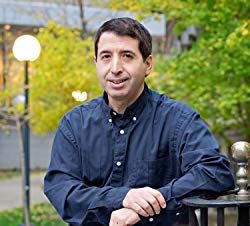Was the big bang the beginning of time? Is the future as fixed as the present or the past? Could the “flow” of time be an illusion?
You might think that 100 years after Einstein gave us his theory of relativity, we’d have it all sorted out. But the “Great Time Debate,” held at U of T in late January featuring two physicists and a philosopher, showed this was far from the case.
Dick Bond, a U of T cosmologist and physics professor, raised the possibility that what we observe with our telescopes may be just one “bubble” in a vastly larger “landscape” of multiple universes. That idea, rooted in the “inflation” model of the big bang, has widespread support – yet the question of how “time” in one universe relates to “time” in another universe is far from clear.
James R. Brown, a U of T philosophy professor, meanwhile, argued that past, present, and future – as fundamental as they may seem – do not make up part of our “objective reality.” He says that past, present, and future must all be considered equally “real.” This view is sometimes known as the “block universe,” in which time is represented as just another dimension, analogous to the dimensions of space, and all parts of the block are equally real. Incredibly, this leaves the so-called “flow” of time as mere illusion, Brown says. The future is just as fixed and as impossible to change as the past.
Lee Smolin, a physicist with the Perimeter Institute in Waterloo, Ontario, took issue with that argument: For him, the passage of time is real. He rejects both the block universe and the idea of multiple universes, preferring the idea of a single universe in which the passage of time is real. In this view, the laws of physics can themselves change and evolve over time. In other words, nothing exists “timelessly” – not even the laws themselves. Smolin described his theory of “cosmological natural selection” in his book The Life of the Cosmos, and has elaborated on the idea of evolving natural laws in a recent article in Physics World.
Whether they absorbed every detail or not, the sell-out crowd of more than 600 people listened to the three panellists for nearly two hours – and then put forward their own challenging questions during a spirited Q&A session.
As the event’s moderator, I took the liberty of asking the panellists about time travel, a topic that seems to be a perpetual favourite among science fiction writers. While forward-directed time travel is a basic aspect of Einstein’s theory, and loops through time are not specifically prohibited, all three panellists were skeptical of the idea of travelling backward through time.
The event was hosted by the Centre for Inquiry and the University of Toronto Secular Alliance, with sponsorship from the Association for Science and Reason and the U of T Astronomy & Space Exploration Society.
Recent Posts
U of T’s 197th Birthday Quiz
Test your knowledge of all things U of T in honour of the university’s 197th anniversary on March 15!
Are Cold Plunges Good for You?
Research suggests they are, in three ways
Work Has Changed. So Have the Qualities of Good Leadership
Rapid shifts in everything from technology to employee expectations are pressuring leaders to constantly adapt






